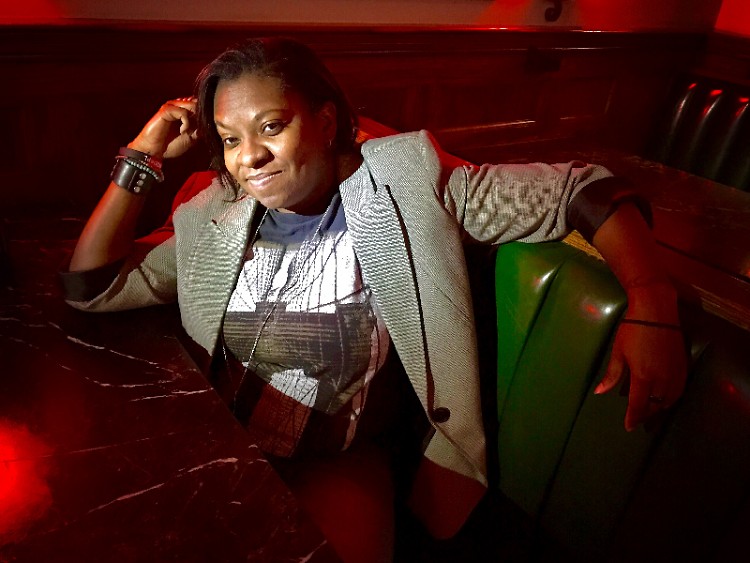Part 4
During a recent roundtable discussion with local small business owners, hosted by MiBiz, the all-white panel brought up the large economic gap between people of color and whites in Grand Rapids. As I continue the conversation in Part 4 of this response series, I talked to Adriane Johnson about her reaction. Johnson, an entrepreneur of color, runs Rebellious Creatives, which provides affordable web design for start-up businesses.
From the roundtable discussion
MiBiz: "While Grand Rapids is getting a reputation as a bad place for African Americans, Detroit is getting its own reputation as a hub for startups and entrepreneurs. What does that cross-state dynamic look like going forward?"
Chris Reinbold of Six/Ten Ventures and The Funky Buddha Yoga Hothouse said, "… I’d say it’s a threat to Grand Rapids…People are making buying decisions out of college on what city they want to live in."
Shelby Reno of CKO Kickboxing and XVentures said, "If we had to pick a market that comes here, it’s primarily Detroit…They’re looking to West Michigan as a solid expansion opportunity."
Chris Reinbold said, "We’ll know we’re doing it right when we hear that firms from…West Michigan are starting to kick ass in Detroit."
Are we only highlighting the most popular people and their businesses to avoid the harsh truth about racism?
Johnson's initial response to the roundtable coverage was that it was a good start, but lacking. “I think [this is] one of the most important things missed when it comes to highlighting local businesses: those of a diverse nature have small businesses as well. They are impacted by [these same concerns]. Why aren't they invited to these conversations in order to weigh in a better perspective? How are things for them as a business owner? Is there a lack of knowledge when it comes to recognizing small businesses of diversified backgrounds? Or are we only highlighting the most popular people and their businesses to avoid the harsh truth about racism?"
In the question of Grand Rapids' reputation versus Detroit's, Johnson thought Grand Rapids' problems were glossed over. "Some panelists alluded to the issue being nationwide; others were more concerned about how to expand their own business connections with Detroit. The real question couldn't be addressed. There was no relevant experience [at the table] to even address the question. It’s important to have an actually diverse panel to expertly answer these types of questions.”
To provide context: as of the most recent census data of 2007, Detroit has over 32,000 Black-owned businesses which have held on through difficult times. They make up over 60 percent of the economy in the city; minority-owned firms in general make up 82 percent. However, gentrification is starting to squeeze out many of these business owners. By comparison, Grand Rapids has about 13 percent minority-owned businesses. In a city that is 36 percent people of color, that's a significant gap. Historically West Michigan has difficulty attracting and retaining diverse entrepreneurs and business professionals. As Michigan is predicted to grow more diverse over the coming century, this will continue to be an issue to address.
'They have to work a little harder at proving themselves in the entrepreneurial world'
When asked about the business climate, Johnson said that this area can be good for start-ups. “The city seeks people who visit from out of town, which funds our city's growth. Unique or specialty crafted businesses are top attractions to new visitors, so why not continue the growth of new ideas in business?"
"The success of a start-up is all in the work you put into it, who you know, and who is willing to advocate for your business. For an entrepreneur of color, [a new business] can still be a success depending on what the business is, who it's being marketed to, and how much work is being put into the success of it."
Johnson, who is active in the city and the LGBTQ community, said, “I've heard from some business owners of other cultural backgrounds or those of the LGBTQ community. They have to work a little harder at proving themselves in the entrepreneurial world. There are more hoops to jump through for some reason. It's not a completely impossible thing to be a success, but if you are being given the runaround and you have a legit business, that's an issue worth addressing for sure.”
The climate since the election
When the topic of the election came up, Johnson said, "I hope this election was an eye-opener in recognizing that a major change needs to happen in how we connect with one another. We need each other more than ever to survive these next four years of a wild and uncertain future.”
“As long as Grand Rapids continues the growth of small businesses and startups, I’ll provide a service directed towards that. My business is for those who can't afford the high cost of some of these web development companies. I've made sure to outline that you get pretty high quality design work at an affordable cost. I understand the importance of visual communication. I'm honest and upfront about what I can and can't do and I'm willing to build a website with the business owner so they get what they want.”
Johnson said the election doesn't change her own plans. "The only way the election would affect my business is if it became completely impossible for anyone to start a business, or if there are racist business owners who refuse services. Other than that, I plan to carry on business as usual to help other businesses look their best."
Being culturally educated
I asked Johnson how small business owners can overcome racial disparity. She was quick to point out that first we have to visualize what the problem actually is. Economic disparity "refers to a difference that may or may not be related to discrimination." Johnson said the numbers of any one racial group in the city may be too small to know for sure. The percentage represented at any networking event may show that not everyone is as well-connected. Perhaps an individual hiring decision or policy decision doesn't seem to be affected by race in that particular moment.
But, Johnson said, discrimination is bigger than that. First, "there is more at issue than race. There’s the LGBTQ community, people with a disability status, religious practice, income status, and so on." Second, it's a lack of cultural education and reaching out.
"Business owners and people in general should take a moment to see just who they surround themselves with and how diverse that group is. If you're surrounded by people who look just like you, then how can you be culturally educated about anything? How can you know what needs to be done unless you go outside of your circle and research for yourself? This is for all of us to do; it's not just one-sided."
Cultural education, Johnson indicated, is based on relationships. "If people would learn more about each other instead of making an assumption based on hearsay, or what they see without hearing the story … [if they would] not be so intimidated about appearances, or divided based on wealth, we might learn something substantial about each other that could help us grow closer -- especially in relation to what goes on around us."
Let's make new headlines
Johnson has a vision of Grand Rapids in which people continue to expand their circles and come together in new ways. It's a vision of coalition-building and achieving some unity as a metropolitan area. Listening to her and learning about her business, I started to wonder what could be achieved by a coalition of businesses like Johnson's and those interviewed in MiBiz. What if they decided to turn the national headlines around in the next five years?
"Grand Rapids moves from worst city for African-Americans to best.”
Followed by a stunned, "How did they do it?"
Certainly, consumers in Grand Rapids could have a hand in the work. If consumers shifted, say, 20 percent of their local spending to minority-owned businesses, that would be a start. If consumers shifted another 30 percent of their local spending to only those businesses who are actively doing anti-racism work and equity work within their own organization - and if they let the businesses involved know why they're making the shift - places like Partners for a Racism-Free Community would have a line out their door. From that leverage point, many other issues would start to loosen and shift.
It would be hard work, and painful. Part of the work would be activism that challenges the current power structure. Yet with a genuine committment to following the leadership of those who have been marginalized, the city could make real and measurable improvement. In the complex context of being a city within the United States, Grand Rapids would still be affected by systemic racism and bias every day. But there is no doubt the work and committment would be worth it.
In Johnson's words, "We need each other more than ever."
The rest of the series:
Part 1: explores journalism's role in perpetuating systemic bias.
Part 2: explores measurable longterm strategies for equity.
Part 3: uncovers a common theme in the journey to equity: mentoring.
The Rapidian, a program of the 501(c)3 nonprofit Community Media Center, relies on the community’s support to help cover the cost of training reporters and publishing content.
We need your help.
If each of our readers and content creators who values this community platform help support its creation and maintenance, The Rapidian can continue to educate and facilitate a conversation around issues for years to come.
Please support The Rapidian and make a contribution today.



